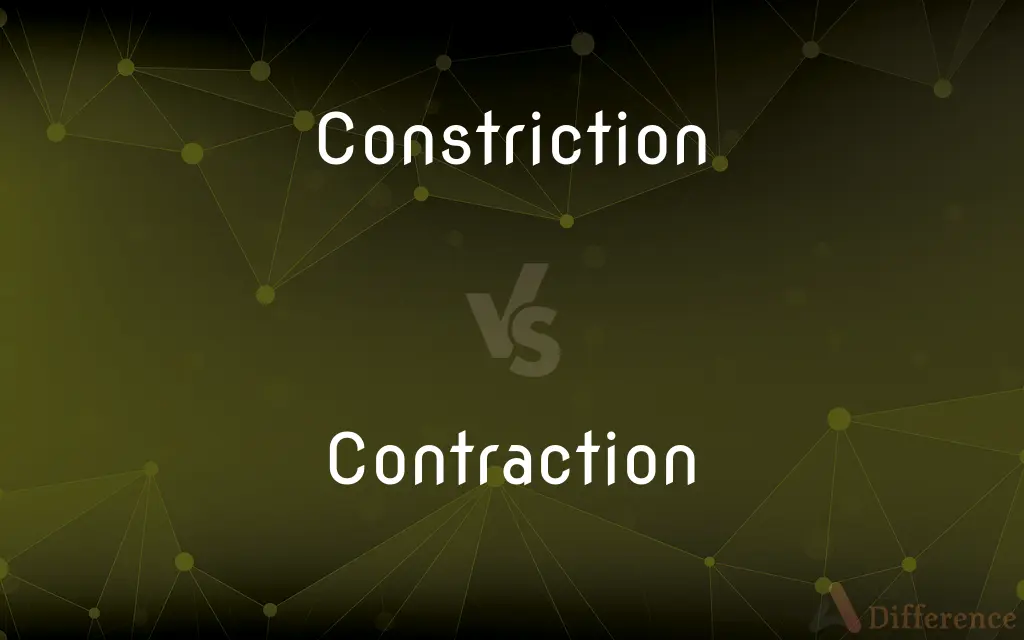Constriction vs. Contraction — What's the Difference?

Difference Between Constriction and Contraction
ADVERTISEMENT
Compare with Definitions
Constriction
Constriction is a method used by various snake species to kill or subdue their prey. Although some species of venomous and mildly venomous snakes do use constriction to subdue their prey, most snakes which use constriction lack venom.
Contraction
The act of contracting or the state of being contracted.
Constriction
The act or process of constricting.
Contraction
A word, as won't from will not, or phrase, as o'clock from of the clock, formed by omitting or combining some of the sounds of a longer phrase.
Constriction
The condition or result of being constricted.
ADVERTISEMENT
Contraction
The formation of such a word.
Constriction
Something that constricts.
Contraction
(Physiology) The shortening and thickening of functioning muscle or muscle fiber.
Constriction
A feeling of tightness or pressure
Fear caused a sudden constriction in my chest.
Contraction
Any of a series of sudden and involuntary tightenings of the uterine muscles occurring before or during childbirth.
Constriction
A constricted or narrow part.
Contraction
A period of decreased business activity.
Constriction
The act of constricting, the state of being constricted, or something that constricts.
Contraction
A reversible reduction in size.
Constriction
A narrow part of something; a stricture.
Contraction
(economics) A period of economic decline or negative growth.
The country's economic contraction was caused by high oil prices.
Constriction
A compression.
Contraction
A shortening of a muscle during its use.
Constriction
The act of constricting by means of some inherent power or by movement or change in the thing itself, as distinguished from compression.
Contraction
A strong and often painful shortening of the uterine muscles prior to or during childbirth.
Constriction
The state of being constricted; the point where a thing is constricted; a narrowing or binding.
A constriction of the parts inservient to speech.
Contraction
(linguistics) A process whereby one or more sounds of a free morpheme (a word) are lost or reduced, such that it becomes a bound morpheme (a clitic) that attaches phonologically to an adjacent word.
In English, didn't, that's, and wanna, the endings -n't, -'s, and -a arose by contraction.
Constriction
A narrowing that reduces the flow through a channel
Contraction
(English orthography) A word with omitted letters replaced by an apostrophe, usually resulting from the above process.
Don't is a contraction of do not; and 'til is a contraction of until.
Constriction
Tight or narrow compression
Contraction
A shorthand symbol indicating an omission for the purpose of brevity.
Constriction
A feeling of tightness in some part of the body;
He felt a constriction in her chest
Emotion caused a constriction of his throat
Contraction
The acquisition of something, generally negative.
Our contraction of debt in this quarter has reduced our ability to attract investors.
Constriction
The action or process of compressing
Contraction
The process of contracting a disease.
The contraction of malaria
Contraction
(phonetics) Syncope, the loss of sounds from within a word.
Contraction
A distinct stage of wound healing, wherein the wound edges are gradually pulled together.
Contraction
The act or process of contracting, shortening, or shrinking; the state of being contracted; as, contraction of the heart, of the pupil of the eye, or of a tendon; the contraction produced by cold.
Contraction
The process of shortening an operation.
Contraction
The act of incurring or becoming subject to, as liabilities, obligation, debts, etc.; the process of becoming subject to; as, the contraction of a disease.
Contraction
Something contracted or abbreviated, as a word or phrase; - as, plenipo for plenipotentiary; crim. con. for criminal conversation, etc.
Contraction
The shortening of a word, or of two words, by the omission of a letter or letters, or by reducing two or more vowels or syllables to one; as, ne'er for never; can't for can not; don't for do not; it's for it is.
Contraction
A marriage contract.
Contraction
(physiology) a shortening or tensing of a part or organ (especially of a muscle or muscle fiber)
Contraction
The process or result of becoming smaller or pressed together;
The contraction of a gas on cooling
Contraction
A word formed from two or more words by omitting or combining some sounds;
`won't' is a contraction of `will not'
`o'clock' is a contraction of `of the clock'
Contraction
The act of decreasing (something) in size or volume or quantity or scope
Share Your Discovery

Previous Comparison
Googolplex vs. Googol
Next Comparison
Leopard vs. Elephant














































